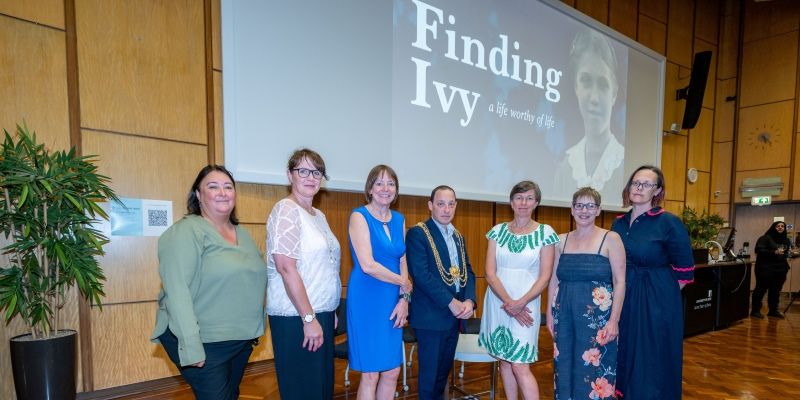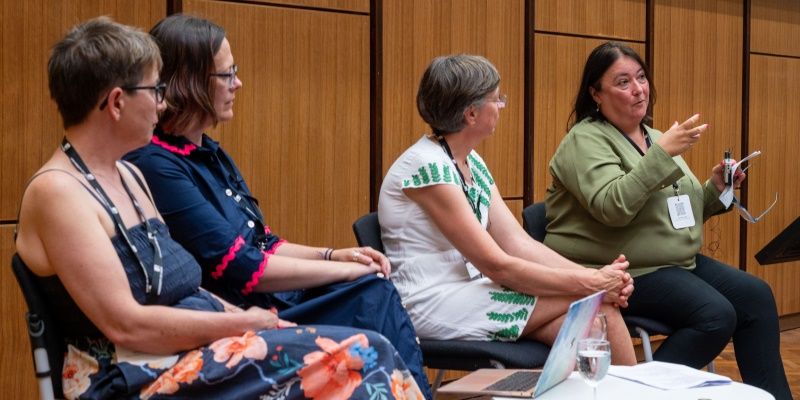
People with physical disabilities and mental health problems still face challenges to live their lives free from discrimination.
While attitudes have moved on, some socially accepted practices have echoes of Nazi Germany, according to an expert panel at the University of Leeds.
Dr Helen Atherton, a lecturer and nurse historian at Leeds, has painstakingly reconstructed the lives of British-born victims of Aktion T4, a Nazi-led killing programme that targeted people with disabilities.
Her research was documented in an exhibition, ‘Finding Ivy – A Life Worthy of Life’, at the University’s Parkinson Court during Learning Disability Week.
These are people the Nazis believed could make no contribution to society.
An accompanying panel discussion, chaired by Councillor Dan Cohen, newly appointed Lord Mayor of Leeds, questioned attitudes towards the most vulnerable today, exploring the extent to which they are accepted as valued citizens.
Between 1940 and 1941 around 70,000 adults were murdered in Germany and Austria because they were deemed to have ‘lives unworthy of life’.
Dr Atherton, who is also a qualified nurse for people with learning disabilities, trawled through thousands of entries in censuses, birth and marriage records, newspapers and Red Cross documents, to reconstruct the identities of 13 victims, including Ivy Angerer.
Dr Helen Atherton told guests: “These are people the Nazis believed could make no contribution to society.
“You can abort a child with Down Syndrome right up until the day of delivery. When certain groups are targeted you have to think about whether that is a discriminatory practice.”

Dr Liz Corcoran, who leads the trustees of the Down Syndrome Research Foundation UK, said: “I want to say thank you to Helen for giving people back their names, the true power of giving these people back their dignity and identity.
“It goes on now when you group people together. Do we see society as a body where we have to cut out the diseased parts? So many of these labels have been recycled in our modern society.”
Jo Lay, Associate Director of Student Education – Quality in the School of Healthcare at the University of Leeds, supports colleagues in ensuring that the needs of people with a learning disability are addressed within the curriculum.
She said: “It is easy as an educator to give the facts but it has so much more impact when it has that personal approach, when you can relate a historical time to someone’s story.
“We need to learn from history and recognise the impact it has had.
“We have legislation and safeguards in society yet at the same time we have other legislation that is negative and not protecting those human rights.”
Massive impact
Also on the panel was Dr Nancy Jennings, relative of Zdenko Hoyos, who was killed aged 37 and is one of the people profiled in Dr Atherton’s research.
Dr Jennings said: “I didn’t know much about him before Helen got in touch. It has really changed how I think about my family. There is a connection there that feels really close.
“It has had a massive impact on me to learn about him.”
The Finding Ivy exhibition has been shown across England, Wales, Germany and Austria.
Professor Shearer West, Vice-Chancellor and President of the University of Leeds, who gave an opening address, said: “The Finding Ivy project raises powerful ethical questions and encourages us to consider and challenge attitudes in society.
“Tackling inequality in education will go some way to tackling health inequalities, while innovation in healthcare will help people live longer, healthier and more fulfilled lives. Through our commitment to research and partnership, we can play our part in breaking down barriers and creating equal opportunity.”
Further information
Read more about the Finding Ivy project in our Spotlight feature.
Main photo caption: Jo Lay, Associate Director of Student Education – Quality in the School of Healthcare, University of Leeds; Professor Angela Graves, Professor of Maternal Health and Professional Education and Head of the School of Healthcare, University of Leeds; Professor Shearer West, Vice-Chancellor and President, University of Leeds; Councillor Dan Cohen, Lord Mayor of Leeds; Dr Nancy Jennings, relative of Zdenko Hoyos; Dr Helen Atherton, lecturer and nurse historian, University of Leeds; Dr Liz Corcoran, head of trustees of the Down Syndrome Research Foundation UK.
Please contact Richard Abbott in the University of Leeds press office at R.Abbott1@leeds.ac.uk.